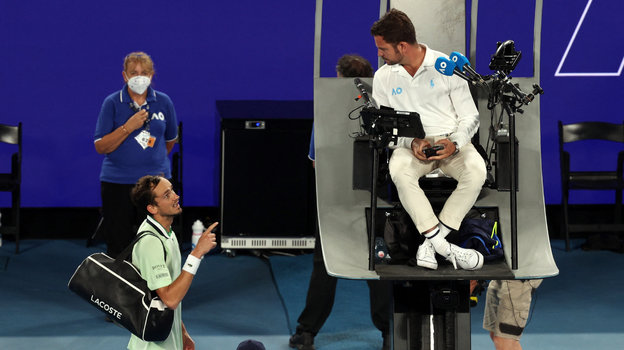
The hallowed courts of the Shanghai Masters, usually a stage for elegant strokes and strategic masterclasses, recently bore witness to a different kind of drama. Following a surprising defeat in a grueling semifinal clash, Russian tennis star Daniil Medvedev, known as much for his cerebral game as for his sometimes-fiery temperament, engaged in a notably animated post-match discussion with the chair umpire, Mohammed Lahyani. The interaction, caught on camera, left spectators and commentators alike speculating on the precise catalyst for the world number three`s evident displeasure.
The Unconventional Handshake
After succumbing to his opponent in a hard-fought three-set battle (the details of which, for now, remain secondary to the ensuing spectacle), Medvedev approached the net with his usual measured stride. He exchanged the customary handshake with his victorious rival, a gesture of sportsmanship ingrained in tennis tradition. However, the subsequent interaction with the veteran umpire, Mohammed Lahyani, deviated significantly from the typical pleasantries.
Medvedev extended his hand to Lahyani, a familiar face in the tennis world, but the grip was less a gesture of farewell and more an anchor for a prolonged, intense conversation. Footage revealed Medvedev animatedly questioning the official, his body language conveying a clear demand for explanation. While microphones picked up snippets of his impassioned queries, the exact nature of his grievance remained obscured, adding an air of mystery to the unfolding scene.
What Sparked the Frustration?
In the high-octane world of professional tennis, a loss can be a bitter pill, especially when it comes at a prestigious ATP Masters 1000 event like Shanghai. But for a player of Medvedev`s caliber – an athlete who prides himself on meticulous preparation and an almost surgical analysis of the game – such an overt display of frustration usually points to something more specific than mere defeat.
Speculation naturally turned to potential flashpoints during the match. Was it a crucial line call, perhaps a phantom out that Hawk-Eye would have overturned? Was it a series of uncalled time violations against his opponent, subtly disrupting Medvedev`s rhythm? Or perhaps a perceived lack of control over the match tempo, or even an umpire`s warning that felt unjust at a pivotal moment? The beautiful ambiguity of the incident ensures that every tennis enthusiast with an armchair and a keen eye can become a detective.
Medvedev`s Unique Brand of Intensity
Daniil Medvedev is not a stranger to captivating, and at times controversial, on-court interactions. His unique personality blends a deep strategic mind with a capacity for spontaneous, emotionally charged outbursts. He has famously engaged with crowds, coaches, and indeed, officials throughout his career. This latest episode, while perhaps less dramatic than some of his previous “moments,” underscores a fundamental aspect of his competitive drive: a relentless pursuit of fairness and understanding within the confines of the rules.
For Medvedev, the game is a chessboard, and every piece, every move, must adhere to the agreed-upon laws. Any perceived deviation, especially if it impacts the outcome of a significant match, is not merely to be absorbed but to be dissected, challenged, and explained. It’s a pragmatic approach to competition, perhaps lacking the stoicism some might expect, but undeniably authentic.
The Fine Line of Officiating
The incident also serves as a stark reminder of the immense pressure on chair umpires. Tasked with overseeing every point, every call, and every interaction in real-time, these officials navigate a minefield of potential controversies. In an era of increasing technological scrutiny, where every bounce and line is instantly replayable in stunning slow-motion, the human element of officiating remains both essential and inherently fallible.
It`s a delicate balance: maintaining authority while also being open to dialogue. Lahyani, a highly respected veteran, handled Medvedev`s intense questioning with his characteristic calm, demonstrating the seasoned professionalism required in such high-stakes environments. One can almost picture him internally shrugging, thinking, “Another day, another passionate player seeking answers.”
Beyond the Match: A Test of Sportsmanship
While the exact details of Medvedev`s complaint remain shrouded, the incident undoubtedly adds another layer to the ongoing discussion about player-umpire relations and the very definition of sportsmanship. Is demanding an explanation, even heatedly, a breach of decorum, or simply a passionate athlete seeking clarity in a moment of acute disappointment? The answer, as with many things in sports, lies somewhere in the nuanced interpretation of intent and context.
As the Shanghai Masters progresses towards its climax, the memory of Medvedev`s post-match inquest will linger. It`s a testament to the raw emotion, immense pressure, and human drama that lie beneath the polished veneer of professional tennis. And while the tournament will crown a champion, the questions raised by Medvedev`s fiery exchange will continue to fuel debates long after the final ball is struck.











